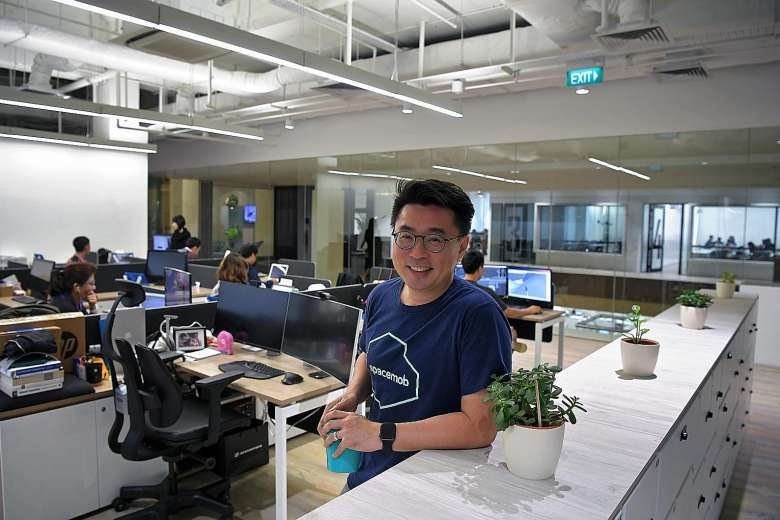Rise Of The Shared Workspace

Co-working spaces are expanding to accommodate a growing shift in Singapore's workplace culture towards collaboration.
While these shared working environments have long attracted freelancers and start-ups, small and medium-sized enterprises and even large firms are beginning to recognise the benefits and taking up membership.
The days when companies could operate or even thrive in silos are long gone, say many co-working players; collaboration is the new way of working.
Mr Turochas Fuad, founder and chief executive of co-working operator Spacemob, believes that the possibility of partnering smaller players is the main driver in attracting larger firms.
"Multinationals can easily afford their own spaces, but they recognise that it's about adopting a space that will allow them to tap talent that can bring value to them," he said.
"In fact, some of them go as far as incubating or creating programmes to accelerate certain projects which will directly benefit their companies."
While largely driven by the possibilities of collaboration, this shift away from the traditional office model is also being reinforced by economic considerations.
"Companies save a lot in upfront costs in equipping the space with the necessary facilities. Also, they gain more flexibility as, instead of signing a lease for a few years, they work with us on a monthly basis. This provides more options as the companies scale up or contract," Mr Fuad noted.
In addition, the casual atmosphere in these spaces, which is commonly associated with creative freelancers and hipster start-ups, may also serve to increase productivity and innovation among workers.
Mr Kong Wan Sing, founder and chief executive of co-working operator JustCo, said: "Work already piles up stress on employees. Working in a fun place definitely increases productivity by reducing stress. Members may also gain new ideas for their own lines of work in the process."
Co-working spaces have sprouted to bridge certain gaps found in the traditional office model as well. Family-friendly co-working space Trehaus is an example.
Trehaus co-founder Elaine Kim said: "We started the space to address the rigid workplace culture of today... which makes it difficult for young professionals who recognise the importance of family as they pursue their careers."
Trehaus offers facilities for nursing as well as child minding within its 4,000 sq ft co-working space in Orchard Road, allowing parents to be in close proximity of their children while working.
As more companies become convinced of the benefits that come with these spaces, co-working players have seen a healthy rise in demand in recent years.
"We have been receiving increasing numbers of inquiries compared with last year. Members who were trying out our spaces are now deciding to stay for the longer term. In total, we now have around 11,000 members," Mr Kong said.
The optimism surrounding the co-working industry's prospects has given players enough confidence to expand their businesses both locally and abroad.
JustCo expects to add two new local spaces in the coming year, while Spacemob plans to launch a new facility in Jakarta by the end of the second quarter this year.
Ms June Chua, executive director at real estate firm Cushman & Wakefield, noted that while co- working spaces have undeniably been gaining traction in the past few years, overall demand for traditional offices has not been significantly affected.
"While we have seen smaller tenants moving from serviced offices to co-working spaces, not many office buildings have been losing tenants," she said.
She also noted that the collaborative set-ups of co-working spaces may not be suited to certain firms.
"Some companies will still prefer to have their own traditional offices because of privacy and confidentiality reasons, as well as the immovable nature of particular operations. There will always be demand for traditional offices," she said.
This has not stopped co-working spaces from devising innovative ways to add value to their members in order to stay competitive.
Spacemob offers its members healthcare insurance and payroll processing, while JustCo organises lifestyle and enrichment events, and Trehaus provides educational programmes for children.
Mr Kong believes that as operators continue to add value for their members, the shift towards collaborative spaces will continue.
"While it may be difficult to convince older and more traditional bosses, it's only a matter of time before they realise such spaces are about integrating into a community while improving capabilities at the same time," he said.
"Co-working spaces are the future. Collaboration is the new way of working."




